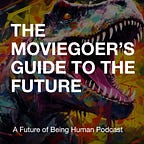Chapter 8 of Films from the Future: The Technology and Morality of Sci-Fi movies, read by author Andrew Maynard
In this episode: Ex Machina
Plato’s Cave | The Lure of Permissionless Innovation | Technologies of Hubris | Superintelligence | Defining Artificial Intelligence | Artificial Manipulation
In some ways everything about artificial intelligence has changed over the past 12 months. In others, little has changed.
The chapter behind this week’s episode of The Moviegoer’s Guide was written over five years ago, and so you might expect it to feel a little outdated. And in some respects it is, haven been created before large language models and generative AI was such a big thing.
And yet the underlying ideas remain profoundly important — probably more so now than when I was writing it.
Looking back, I’m still impressed by how prescient the movie Ex Machina was when it comes to overarching questions such as the right to experiment and develop AI without permission, the nature of intelligence, and the risks of us being manipulated by the machines we create.
Threading through the chapter is Plato’s allegory of the cave. It’s an allegory that Ex Machina plays with to good effect — something that we tease out in class when I teach from the movie. It’s also an allegory that still has the power to offer up new insights as we get ever-closer to developing machines that have awareness and agency, and that are not bound by our biologically grounded and very human ideas of right and wrong — and that become the “enlightened” that have the choice of bringing humans out of the cave of our limited understanding … or leave us there, to be manipulated, used, and enslaved.
Of course, one of the challenges of burying the ideas explored here in a book that most dismiss as simply being about movies is that they struggle to see the light of day — buried in their own metaphorical cave. Hopefully this podcast will help them find their way to the light.
About Films from the Future: I started writing Films from the Future in 2017. The intent was to explore the deeply complex landscape around emerging technologies, the future, and socially responsible innovation, in a way that would be accessible to most readers, and at the same time provide nuanced and important insights that weren’t available anywhere else.
One of the challenges with most books about tech and the future is that they take a polarized stance — we’re either all going to die unless we do something different, or technology is going to save the world. These sell — people love reading about extremes. But they’re not that helpful when it comes to navigating a deeply complex tech innovation landscape where there few right and wrong answers, where it’s important to weave together insights from many different areas of expertise — including the arts and humanities, and where dialogue and discussion are far more important than preaching.
And so I set out to write about emerging and converging technologies in as inclusive and accessible a way as I knew how, with the aim of taking readers on a compelling journey into the future where their thoughts and ideas were just as important as mine.
The result was a book that uses movies as a way to open up conversations about what responsible innovation means in a world that’s changing faster than ever before, and where new technologies are transforming how we think about the future and what it holds.
Of course some of the technologies it covers have moved on since I started writing the book. But at the end of the day this is not a book about science fiction movies, or about specific technologies, but about how all of us can think differently about our roles in ensuring the future we’re building is better than the past we leave behind.
I hope you enjoy these recordings of me narrating it — this is a book that reflects my voice quite deeply in the writing, and so it only made sense for me to one day actually read it aloud!
For more information on the book, visit https://andrewmaynard.net/films-from-the-future/











